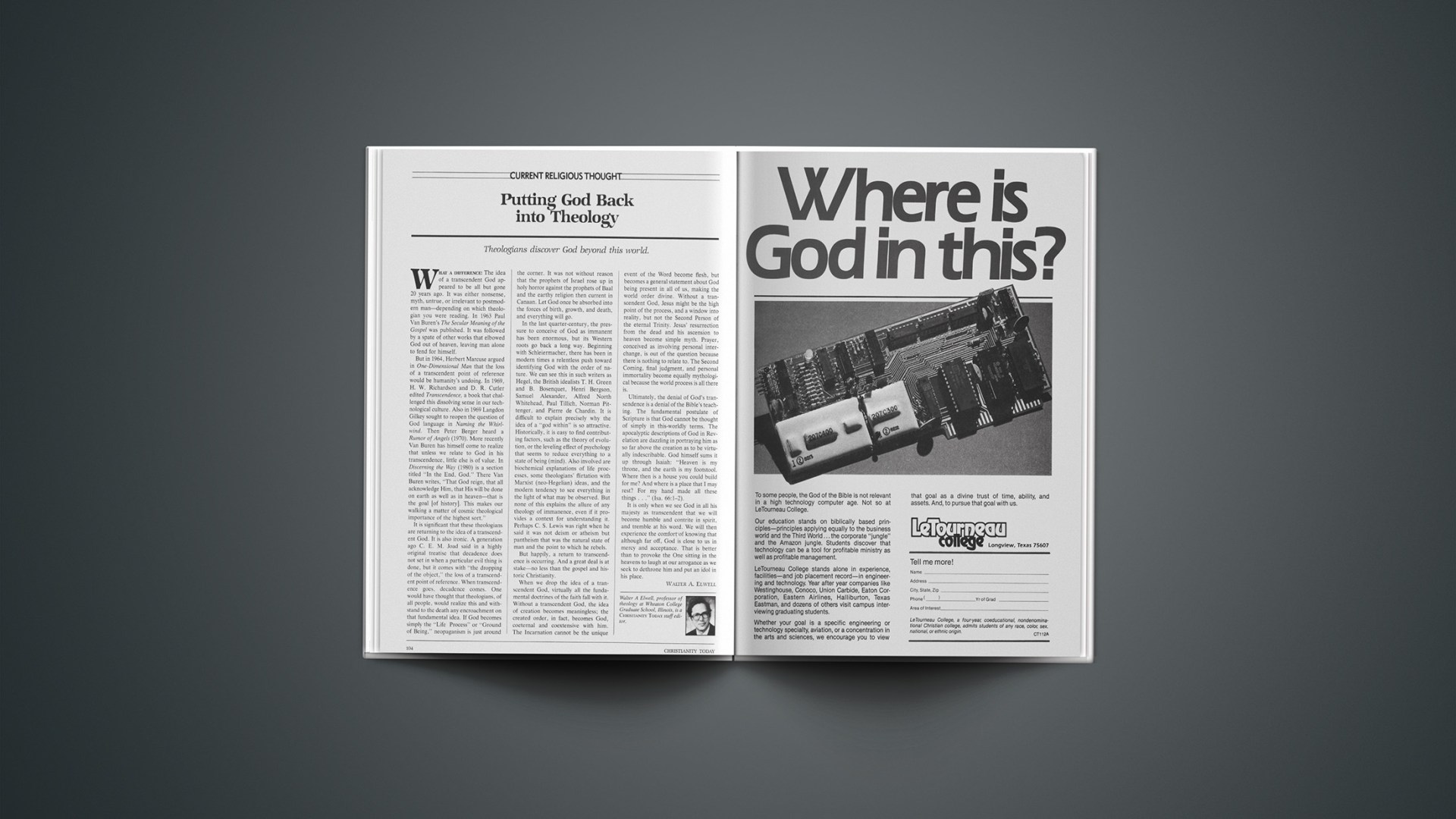Theologians discover God beyond this world.
What a difference! The idea of a transcendent God appeared to be all but gone 20 years ago. It was either nonsense, myth, untrue, or irrelevant to postmodern man—depending on which theologian you were reading. In 1963 Paul Van Buren’s The Secular Meaning of the Gospel was published. It was followed by a spate of other works that elbowed God out of heaven, leaving man alone to fend for himself.
But in 1964, Herbert Marcuse argued in One-Dimensional Man that the loss of a transcendent point of reference would be humanity’s undoing. In 1969, H. W. Richardson and D. R. Cutler edited Transcendence, a book that challenged this dissolving sense in our technological culture. Also in 1969 Langdon Gilkey sought to reopen the question of God language in Naming the Whirlwind. Then Peter Berger heard a Rumor of Angels (1970). More recently Van Buren has himself come to realize that unless we relate to God in his transcendence, little else is of value. In Discerning the Way (1980) is a section titled “In the End, God.” There Van Buren writes, “That God reign, that all acknowledge Him, that His will be done on earth as well as in heaven—that is the goal [of history]. This makes our walking a matter of cosmic theological importance of the highest sort.”
It is significant that these theologians are returning to the idea of a transcendent God. It is also ironic. A generation ago C. E. M. Joad said in a highly original treatise that decadence does not set in when a particular evil thing is done, but it comes with “the dropping of the object,” the loss of a transcendent point of reference. When transcendence goes, decadence comes. One would have thought that theologians, of all people, would realize this and withstand to the death any encroachment on that fundamental idea. If God becomes simply the “Life Process” or “Ground of Being,” neopaganism is just around the corner. It was not without reason that the prophets of Israel rose up in holy horror against the prophets of Baal and the earthy religion then current in Canaan. Let God once be absorbed into the forces of birth, growth, and death, and everything will go.
In the last quarter-century, the pressure to conceive of God as immanent has been enormous, but its Western roots go back a long way. Beginning with Schleiermacher, there has been in modern times a relentless push toward identifying God with the order of nature. We can see this in such writers as Hegel, the British idealists T. H. Green and B. Bosenquet, Henri Bergson, Samuel Alexander, Alfred North Whitehead, Paul Tillich, Norman Pittenger, and Pierre de Chardin. It is difficult to explain precisely why the idea of a “god within” is so attractive. Historically, it is easy to find contributing factors, such as the theory of evolution, or the leveling effect of psychology that seems to reduce everything to a state of being (mind). Also involved are biochemical explanations of life processes, some theologians’ flirtation with Marxist (neo-Hegelian) ideas, and the modern tendency to see everything in the light of what may be observed. But none of this explains the allure of any theology of immanence, even if it provides a context for understanding it. Perhaps C. S. Lewis was right when he said it was not deism or atheism but pantheism that was the natural state of man and the point to which he rebels.
But happily, a return to transcendence is occurring. And a great deal is at stake—no less than the gospel and historic Christianity.
When we drop the idea of a transcendent God, virtually all the fundamental doctrines of the faith fall with it. Without a transcendent God, the idea of creation becomes meaningless; the created order, in fact, becomes God, coeternal and coextensive with him. The Incarnation cannot be the unique event of the Word become flesh, but becomes a general statement about God being present in all of us, making the world order divine. Without a transcendent God, Jesus might be the high point of the process, and a window into reality, but not the Second Person of the eternal Trinity. Jesus’ resurrection from the dead and his ascension to heaven become simple myth. Prayer, conceived as involving personal interchange, is out of the question because there is nothing to relate to. The Second Coming, final judgment, and personal immortality become equally mythological because the world process is all there is.
Ultimately, the denial of God’s transendence is a denial of the Bible’s teaching. The fundamental postulate of Scripture is that God cannot be thought of simply in this-worldly terms. The apocalyptic descriptions of God in Revelation are dazzling in portraying him as so far above the creation as to be virtually indescribable. God himself sums it up through Isaiah: “Heaven is my throne, and the earth is my footstool. Where then is a house you could build for me? And where is a place that I may rest? For my hand made all these things …” (Isa. 66:1–2).
It is only when we see God in all his majesty as transcendent that we will become humble and contrite in spirit, and tremble at his word. We will then experience the comfort of knowing that although far off, God is close to us in mercy and acceptance. That is better than to provoke the One sitting in the heavens to laugh at our arrogance as we seek to dethrone him and put an idol in his place.
Walter A Elwell, professor of theology at Wheaton College Graduate School, Illinois, is a CHRISTIANITY TODAY staff editor.










